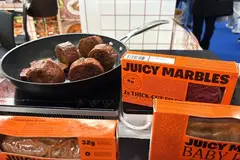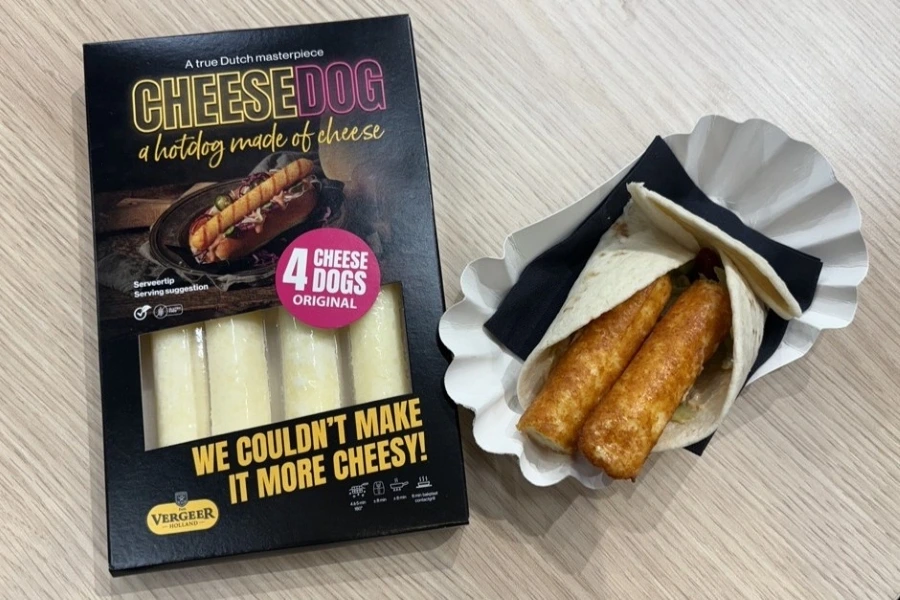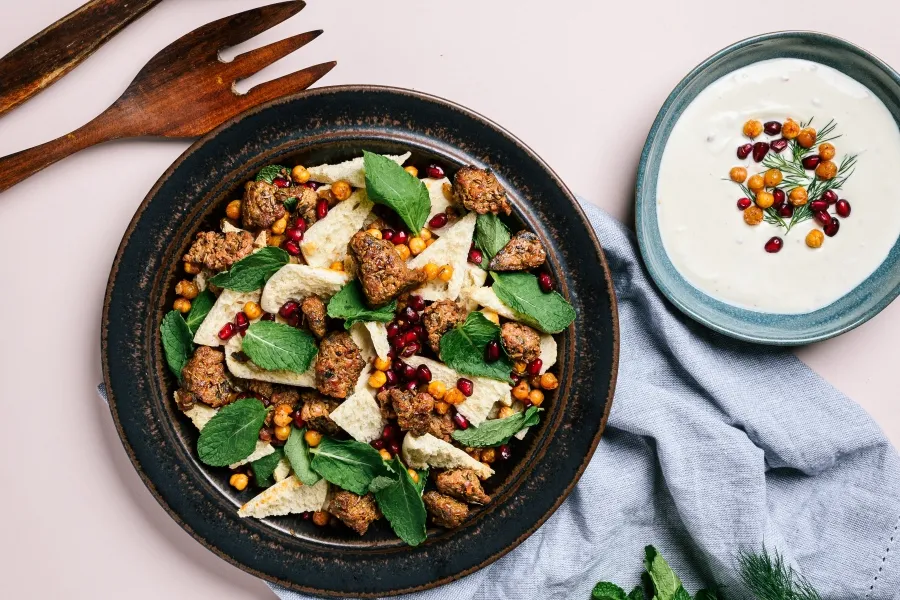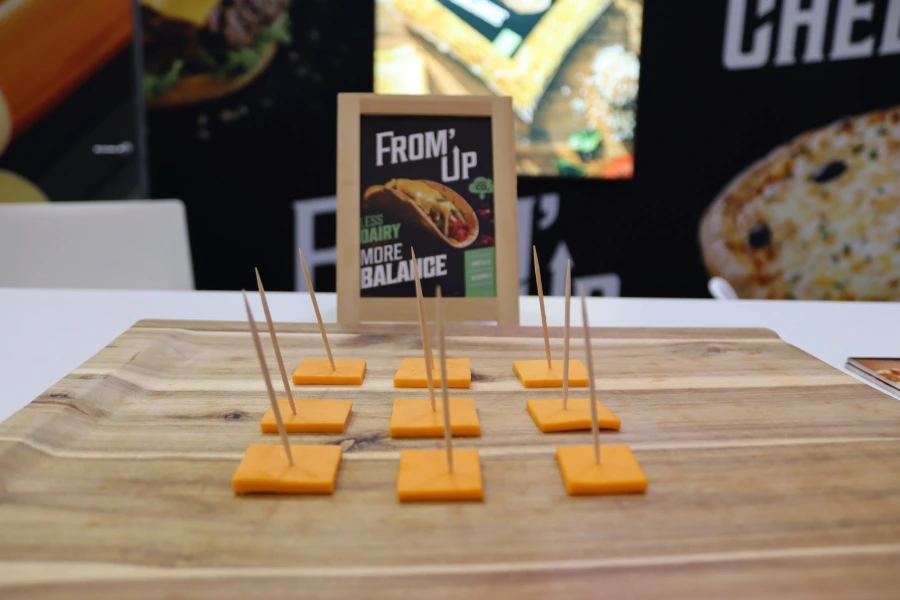
- Industry news
Industry news
- Category news
Category news
- Reports
- Key trends
- Multimedia
- Journal
- Events
- Suppliers
- Home
- Industry news
Industry news
- Category news
Category news
- Reports
- Key trends
- Multimedia
- Events
- Suppliers
Anuga 2025 live: Alt-protein sector splinters into vegetable-forward basics, high-tech analogs & hybrid innovation
Key takeaways
- Anuga 2025 marks a milestone for alternative proteins, featuring its first-ever dedicated hall for the sector.
- Innovation spans from simple whole-food approaches to high-tech fermentation and 3D-assembled meats.
- Hybrid and dairy-based innovations are gaining ground, with firms blending plant and animal ingredients.

The alternative protein sector is rapidly diversifying as innovators push beyond first-generation plant-based meat and dairy analogs. Some of the latest iterations feature everything from humble, whole vegetable ingredients to remarkably meat-like 3D-assembled whole cuts and combinations with actual meat or dairy. Food Ingredients First speaks to companies on the show floor of Anuga 2025, taking place October 4-8 in Cologne, Germany.
Notably, this is the first time in Anuga’s 106-year history to feature a hall exclusively dedicated to alternative proteins, underscoring how the trade show is putting sustainability at the heart of the global food conversation.
Vegetable parade
With consumers increasingly wary of ultra-processed foods and “unnatural” ingredients, Danish start-up The Green Farm presented a simple patty that brings wholesome vegetables back to the center of the plate. The product contains just white cabbage, fermented oats, beets, onion, salt, and pepper. It is then fried in rapeseed oil.
Ronni Sorensen, partner at the Green Farm, says the company’s mission was never to replicate meat. “The mission is to make something good, tasty, and with clean ingredients.”
Meanwhile, Slovenia-based company Grashka is offering visitors a taste of its fermented chickpea and almond blocks, among other deli-style specialties. Founder Martin Rojnik says he was inspired by his work in a Michelin-star restaurant to harness fermentation in simple plant ingredients, which can be delicious in their own right. “A chickpea block doesn’t need to be cheese. We leave the flavor of chickpea in because the main ingredient is chickpea – that’s how it should taste.”
 Dutch cheese brand Vergeer won the 2025 Anuga Taste Innovation award for its hot dog made of cheese.Interestingly, cheese itself is also finding a place in the alt-protein space. Dutch cheese brand Vergeer took home the 2025 Anuga taste innovation award for its Cheese Dog, “a hot dog made of cheese.” The vegetarian casing around the product holds it all together as the cheese softly melts on the inside while browning and staying firm on the outside. The award-winning mixture combines mozzarella and gouda cheeses.
Dutch cheese brand Vergeer won the 2025 Anuga Taste Innovation award for its hot dog made of cheese.Interestingly, cheese itself is also finding a place in the alt-protein space. Dutch cheese brand Vergeer took home the 2025 Anuga taste innovation award for its Cheese Dog, “a hot dog made of cheese.” The vegetarian casing around the product holds it all together as the cheese softly melts on the inside while browning and staying firm on the outside. The award-winning mixture combines mozzarella and gouda cheeses.
Savory tech-savvy
Falling somewhere in between tech-centric and whole food ingredients, Danish scale-up Matr is showcasing a meaty-tasting mycoprotein product. It is produced with open solid-state fermentation, a technology developed with the help of the Danish Technical University.
The process starts with five locally sourced organic ingredients from Denmark (potatoes, red beets, lupins, split peas, and oats), which are used as a substrate for mycelium to grow through. The fibrous network of the fungi feeds off the plant mixture as it grows, binding the ingredients firmly together as a natural hydrocolloid, while developing a stronger umami taste profile. Different from standard mycoprotein production, the substrate is eaten along with the mycelium.
“The mycelium not only binds but also retains moisture, giving a bouncy and firm bite. This feature makes it especially attractive for foodservice because it can be frozen and thawed without losing any liquids, which can happen with a lot of conventional plant-based products. It can even be boiled without breaking apart,” says Sune Olsen, sales director at Matr.
 The word “matr” comes from the Old Norse word meaning “food.”Matr is currently producing its product in a pilot plant in Denmark, but next week the company will finalize funding to contract a factory set to open mid next year. “We will go from 30 tons a year to 1,000 tons. So from one day to the next we will exponentially grow, and from there we can expand seven times in the factory,” says Olsen. The company is eying Germany as its first large market outside of Denmark to build a consumer base for the product.
The word “matr” comes from the Old Norse word meaning “food.”Matr is currently producing its product in a pilot plant in Denmark, but next week the company will finalize funding to contract a factory set to open mid next year. “We will go from 30 tons a year to 1,000 tons. So from one day to the next we will exponentially grow, and from there we can expand seven times in the factory,” says Olsen. The company is eying Germany as its first large market outside of Denmark to build a consumer base for the product.
3D-assembled “meat”
Slovenia-based Juicy Marbles is showcasing tastings of its 3D assembled meat analogs, including “bone-in” baby ribs and thick-cut steak-like offerings made from neutral-tasting soy.
“The process is similar to 3D printing,” explains Luka Sinček, co-founder at the company, “but instead of printing one fiber at a time, the fibers are produced in bulk by the thousands or millions at a time.” They are then broken down, marinated, and reconstructed into whole cuts. The patented process not only creates a unique texture from high-moisture extruded product, but it also greatly reduces soy off-notes that have traditionally plagued meat analog producers.
“In our marinating process, we are able to wash off some of the residual sugars in the soy protein, making for a cleaner taste. In a later stage, we introduce natural flavors as flavor maskers,” he reveals.
Despite the buzz around cleaner labels, Sincek maintains that realistic plant-based meat analogs can win over consumers with the right formulation.
“What we see with our data is that most of the consumers who try our product come back. There’s difficulty in the market because there are sub-par products out there, and with any huge boom, there is going to be a small decline afterwards,” says Sinček.
 From Up uses 60% dairy cheese in its hybrid innovation, which is launching at the massive Anuga trade show.“Protein needs are still growing, and plant-based protein is one way to do it. We are not in any way against meat actively, but we think consumers are seeking more protein and they are somewhat indifferent to the source — as long as it gives them the experience they want for the right price point.”
From Up uses 60% dairy cheese in its hybrid innovation, which is launching at the massive Anuga trade show.“Protein needs are still growing, and plant-based protein is one way to do it. We are not in any way against meat actively, but we think consumers are seeking more protein and they are somewhat indifferent to the source — as long as it gives them the experience they want for the right price point.”
Hybrids advance
Hybrid innovation is also gaining traction in new product launches. French company AB Technologies launched a new hybrid cheese at the trade fair called From Up. The product contains about 60% real cheese along with potato ingredients and grapeseed oil. Grapeseed oil was chosen as a sustainable and healthy alternative to palm or coconut oil, delivering additional health benefits not typically found in cheese, such as vitamin E and omega-6.
The innovation allows the company to decrease the carbon footprint of the product by 40%, which has been a sticking point for Anuga attendees from Europe. “We received very good feedback during the show, mainly from Scandinavian countries, Belgium, the Netherlands, and France. The industry is very interested in replacing part of natural cheese to reduce their carbon footprint, while giving the melting point and sliceability that dairy cheese offers,” says Alexandre de Ferrier, sales manager at AB Technologies.
Beneo’s brand Meatless is also on the show floor promoting the use of textured plant-proteins to reduce costs, improve health, and sustainability across mass-consumed foods. Niels Hower, who leads the Meatless portfolio, says that hybrids are being launched at a rate of about once a month now, especially in products like pizza toppings and processed meat applications.
Meanwhile, Spain-based Novameat is promoting its extruded plant-based meat analogs as a “pulled” plant-based product, but is also dabbling in hybrid innovation. John Gray, the company’s chief commercial officer, shares that Novameat’s product blends seamlessly and indistinguishably into pulled meat products, even at a high ratio of 50/50.
“I would challenge anyone to identify in a hybrid product which part is meat and which is Novameat,” he says.











